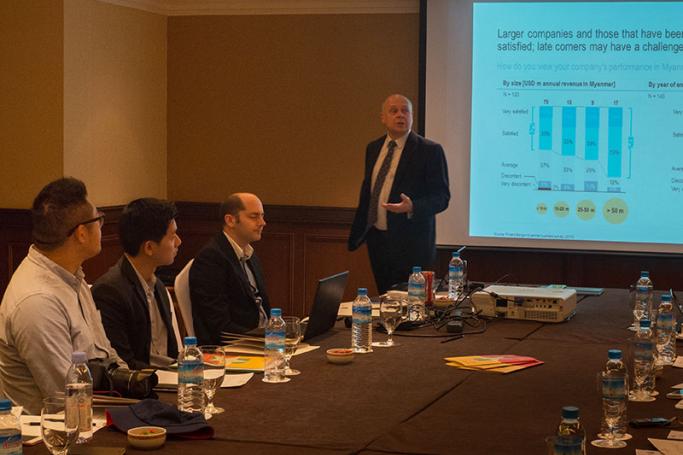Companies in Myanmar expressed concerns about government regulation and policy, despite showing optimism for future growth, in a recently completed survey, said Thomas Klotz Tuesday morning at a press conference in Yangon.
Klotz, the Managing Partner for Southeast Asia for Roland Berger, the German consulting firm that conducted the survey, said, “Seeing from our conversations in the market, there’s a bit of nervousness.”
The survey, which received responses from almost 200 executives at 179 local and international companies operating in Myanmar, highlighted a number of government-related issues that would have to be addressed in order to ensure continued economic growth. This included an unclear economic policy, an unpredictable legislative environment, selective enforcement of regulations, restrictions on investment and access to markets, insufficient intellectual property rights protection, and corruption.
“There are still some questions about what the rules of the game are,” Klotz said, though he added that a lot of work had been done already, mentioning the recently approved Myanmar Investment Law. Other government-related issues identified in the survey include stable electricity supply, broadband development, transport infrastructure, financial sector reform, and promoting fair competition.
Optimism remains high, however, as 73 percent of respondents believed that Myanmar’s economy would improve over the next 12 months. The business environment in Myanmar is “a green space, an open field”, Klotz said, emphasising the country’s “frontier market” advantages, such as its large and young population, its abundant natural resources, and its still nascent economy. The survey respondents agreed, with 80 percent saying that that was a major reason why they began operations in Myanmar.
The rapid growth of the telecommunications industry over the last few years is a prime example of Myanmar’s economic potential. “Telecommunications was the perfect choice for a sector to liberalise,” Klotz said, adding that its successes in the local markets also boosted confidence among investors as participants in the economy. Roland Berger has been involved in the tender processes for international telecommunications licenses in Myanmar since 2013.
Roland Berger conducted the business confidence survey, the first of its kind in Myanmar, in August and September 2016. The companies surveyed represented a broad cross-section of the country’s economy, including telecommunications, real estate, utilities, retail, banking, and tourism.
The press conference, held at the Sule Shangri-La Yangon, was the first time the results of the survey were released, and Klotz said that Roland Berger would like to make the survey a regular exercise.
You are viewing the old site.
Please update your bookmark to https://eng.mizzima.com.
Mizzima Weekly Magazine Issue...
14 December 2023
Spring Revolution Daily News f...
13 December 2023
New UK Burma sanctions welcome...
13 December 2023
Spring Revolution Daily News f...
12 December 2023
Spring Revolution Daily News f...
11 December 2023
Spring Revolution Daily News f...
08 December 2023
Spring Revolution Daily News f...
07 December 2023
Diaspora journalists increasin...
07 December 2023
Euromoney Myanmar Global Investment Forum begins in Nay Pyi Taw












